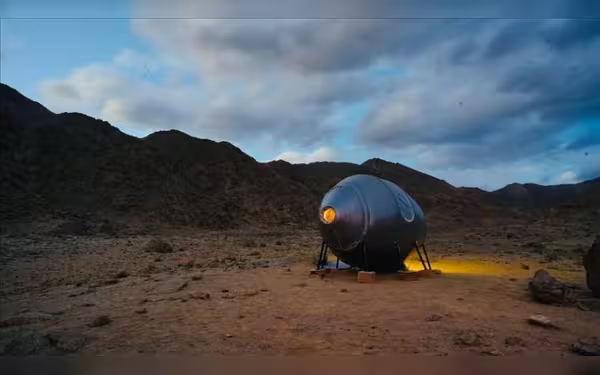Thursday, November 7, 2024 01:42 PM
India Initiates Space Simulation Mission in Ladakh
- ISRO launches 21-day analog space mission in Ladakh.
- Mission simulates Mars and Moon conditions for astronauts.
- Collaboration with top institutions supports Gaganyaan program.
 Image Credits: nation_pk
Image Credits: nation_pkISRO launches a 21-day space simulation mission in Ladakh to prepare for future Mars and Moon explorations.
In a significant advancement for space exploration, the Indian Space Research Organization (ISRO) has initiated a 21-day analog space mission in the Ladakh region, which borders China. This mission aims to simulate the conditions found on Mars and the Moon, providing valuable insights into the challenges that astronauts may face in extreme environments beyond Earth. The choice of Ladakh, with its unique desert and arctic climate, makes it an ideal location for this ambitious project.
The mission is designed to recreate the harsh conditions of interplanetary habitats. Temperatures in Ladakh can vary widely, ranging from a warm 3 to 35 °C (37 to 95 °F) during the summer months, to a chilling −20 to −35 °C in winter. Such extremes are similar to what astronauts might experience on Mars or the Moon, making this simulation crucial for future space missions.
ISRO has collaborated with several esteemed institutions for this mission, including its Human Spaceflight Centre, the University of Ladakh, IIT-Bombay, and Aaka Space Studio, an architecture firm. This joint effort not only supports India’s Gaganyaan program, which aims to send humans into space, but also lays the groundwork for future projects like the Bharatiya Space Station.
In September of the previous year, India made headlines with its first space mission dedicated to studying the Sun. The Aditya-L1 spacecraft is positioned about 1.5 million kilometers (930,000 miles) from Earth, where it will observe solar activities. These missions highlight India's growing capabilities in space exploration and its commitment to advancing scientific knowledge.
It is important to note that Ladakh has been a federally ruled territory since August 5, 2019, when India reorganized Jammu and Kashmir into two separate union territories. This change has allowed for increased focus on development and scientific research in the region.
As we look to the future, the success of this analog space mission could pave the way for more ambitious projects, not just for India but for the global space community. Understanding how to live and work in space is crucial for humanity's next steps in exploration. With each mission, we are one step closer to unlocking the mysteries of our universe and perhaps even establishing a human presence on other planets.













